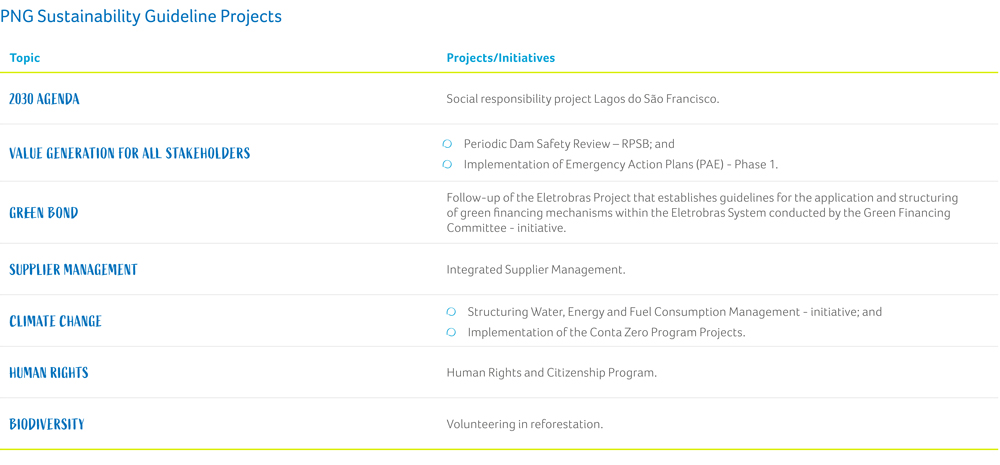Strategy and vision of the future
Long-term strategic planning
Chesf’s Strategic Planning is a dynamic process that involves the constant assessment of scenarios, internal and external factors that influence the business performance and the consequent adaptation of strategic objectives, aiming to improve management and achieve the goals and results proposed, considering a long-term perspective.
As a result of the Strategic Planning review work, foreseen in the Company’s regulatory instruments, a process of updating the organizational identity and strategic objectives of Chesf was developed and, consequently, the construction of its Strategic Map, which meets the challenges of the current scenario of the domestic electricity sector. Below we present the Chesf Strategic Map for the 2020-2035 cycle.

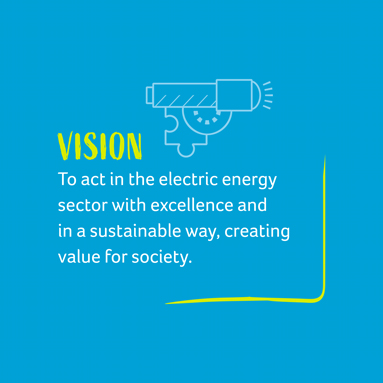
Strategic map

PNG 2019-2023
The PNG of the cycle started in 2019 was based entirely on the holding company’s Business and Management Master Plan (PDNG). Every month, the Board of Executive Officers is gathered to evaluate the fulfillment of the objectives contained in the PNG and the indicators of the Business Performance Goals Contract (CDME), signed between Eletrobras and its subsidiaries. In this way, it is possible to determine deviations between goals and results, take action on occurrences and improve business performance, presenting these results to the Board of Directors.

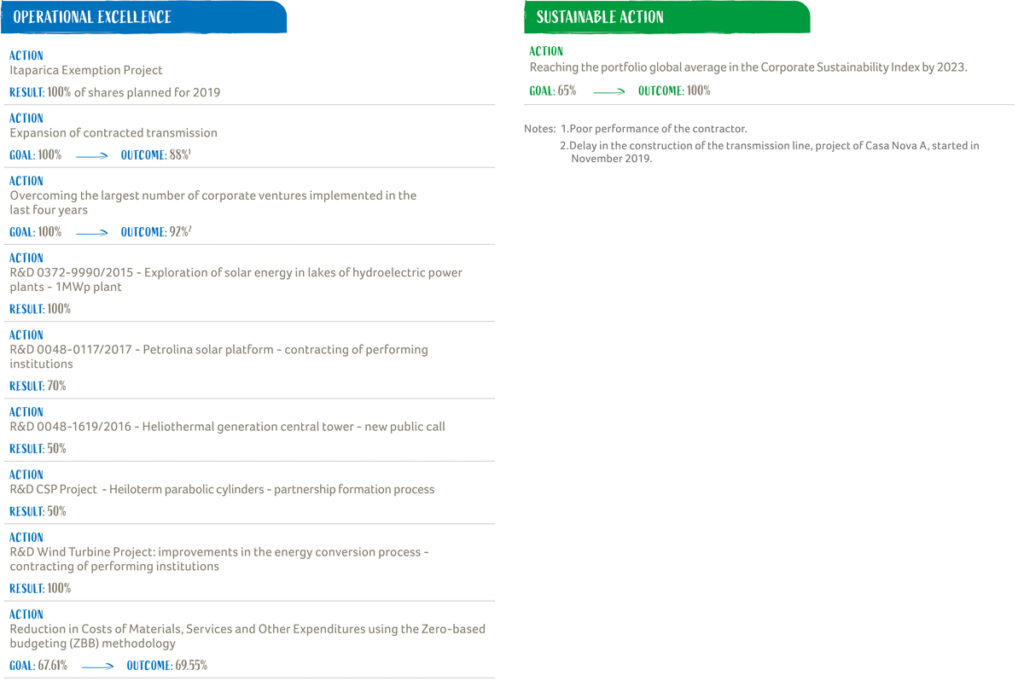
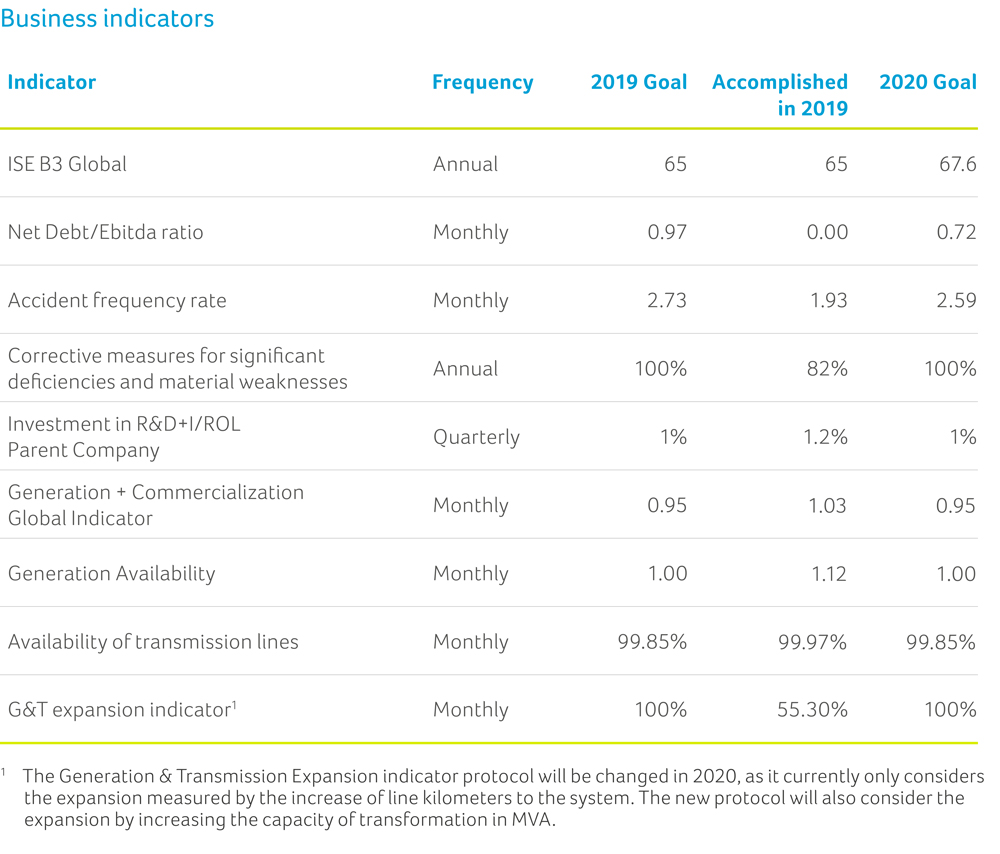
PNG 2020-2024
For the 2020-2024 cycle, plans and business strategies that guide the path for Chesf’s sustainable growth, we highlight the following: the perspective of expansion of the Company, considering the continuity of investments in opportunities related to new forms of renewable energy generation, especially solar and wind sources; the search for operational excellence throughout the value chain; the modernization of Chesf’s facilities, including improvements in the Transmission and Generation area, with a focus on increasing the profitability of these assets; The elimination of pending works and the resumption of efficient participation in auctions; the emphasis on regulatory, land, judicial and environmental issues; the optimization of operating costs, focusing on the reduction of personnel costs and cultural transformation; the sustainable performance; and the improvement of corporate governance and business integrity.
Management
Digital transformation
One of the major advances in this direction, in 2019, was the finalization of ProERP, the SAP ERP Deployment Program (integrated business management system) in single instance for Eletrobras companies. Go Live, the event of joint operation of the platform, took place in January.
We made an important contribution to ERP: the pioneering implementation of the Work Clearance Management (WCM) module to enable the management of all stages of the operational assets’ useful life in an integrated system, with adequate monitoring and treatment of data throughout this cycle. The platform complements the traditional Plants Maintenance (PM) module, for maintenance planning. The WCM was customized for Eletrobras and allowed the integration of important steps, such as Intervention Request (SI), Preliminary Risk Analysis (APR), maneuvering routes, records and analysis of occurrences and disturbances, hydrological measurements, among others.
Other gains arising from the implementation of SAP are for the operation of the Shared Services Center (CSC); greater agility in making business decisions through access to reliable, real-time information; improvement of control in the physical and financial monitoring of enterprises; ensuring the transparency and traceability of corporate information; mitigation of problems and material weaknesses found in SOx audits; and access to information, consolidation and comparison of results of Eletrobras companies in a timely and reliable manner.
The digital transformation is strategic for Eletrobras and its companies, because it translates into automation, optimization and operational safety, among other advantages. An average annual budget of R$ 8.5 million will be allocated to Chesf’s digital transformation.
Shared Service Center (CSC)
Eletrobras companies transactional and business support activities in finance, accounting, human resources, procurement, information technology, legal, logistics, and infrastructure processes, and general services are now centralized by the Shared Services Center, whose implementation was completed in 2019. The new structure standardizes support processes. That same year, Chesf consolidated the implementation of the Northeast CSC unit.
Cybersecurity
Cybersecurity management is permeated by the Information Security Policy and several regulatory instructions, all published, updated and audited to verify their compliance and execution on the subject. The processes follow the main security frameworks, Federal Government regulations and the Code of Ethical Conduct and Conduct of Eletrobras companies.
In 2019, our main actions in relation to cybersecurity were:
- developing and formalizing an appropriate information security framework, including the clear definition of roles and responsibilities;
- developing policies and procedures for managing vulnerabilities, including remediation;
- developing, implementing and exercising the incident response (IR) plan;
- including the topic of information security as part of corporate risk assessment;
- developing a classification program for sensitive information and adopting appropriate tools;
- developing a privacy policy;
- implementing firewalls (technological protection barrier) in substations and power plants; and
- implementing layer 7 firewalls for operation centers.
Risks, crisis and opportunity management
Our corporate risk management methodology follows the guidelines of Eletrobras’ Risk Management Policy. In 2019, we updated the Risk Matrix that takes into account economic, social and environmental aspects and demonstrates the main risks to which we are exposed. For the automation of risk management, the Risk Manager module (GRC/RM) was started under the coordination of Eletrobras. The implementation will take place in 2020.
Regarding internal controls, we participate annually in the SOx Certification process to ensure compliance with the requirements of the U.S. Sarbanes-Oxley Act. All companies in the group are required to meet the requirements of the SOx law in order for Eletrobras to maintain the trading of its shares on the New York Stock Exchange (Nyse).
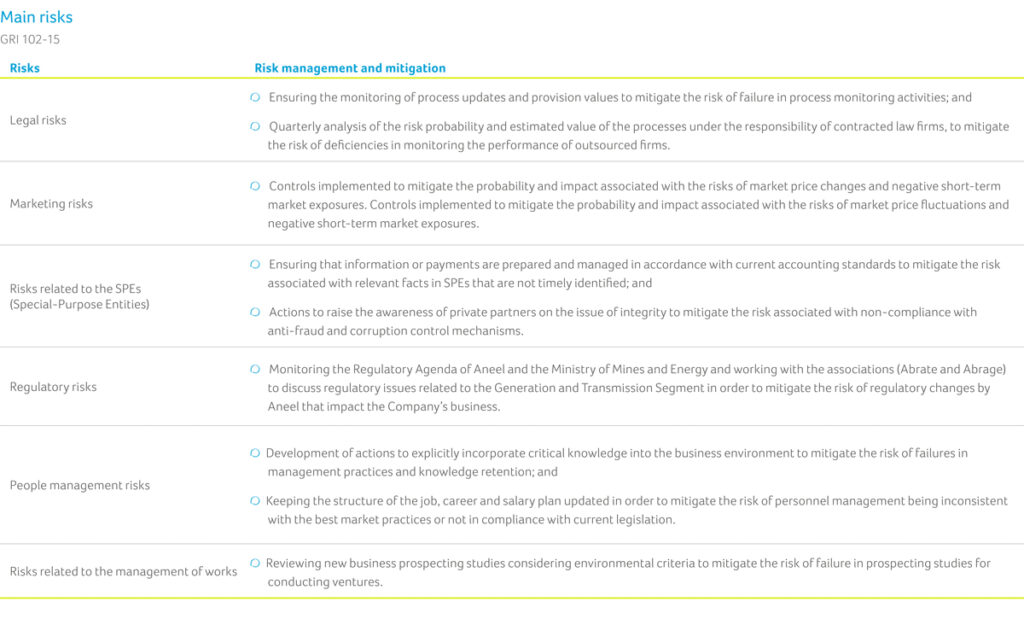
Commitments to sustainability
Chesf establishes guidelines for its actions regarding the promotion of sustainable development, seeking to balance business opportunities with social, economic-financial and environmental responsibility. Among these guidelines are the prioritization of clean and renewable energy production, the rational use of resources, acting as an agent that induces energy efficiency, being committed to ethics and transparency, respecting human rights, adding value for stakeholders and ensuring adequate working conditions and wellbeing for employees.
The main areas of focus for the Sustainability Committee in 2019 were:
- definition of projects/initiatives in the PNG 2020-2024 according to the new PDNG “Sustainability” guideline;
- definition and monitoring of Chesf’s business indicators/goals;
- monitoring the goals and actions of the 2030 Agenda – Sustainable Development Goals; and
- restructuring of the Technical Commission for Waste, Effluent and Emission Management.

